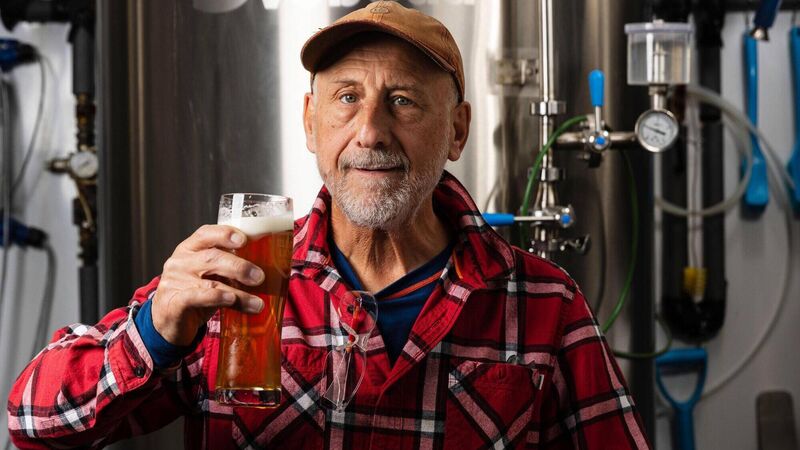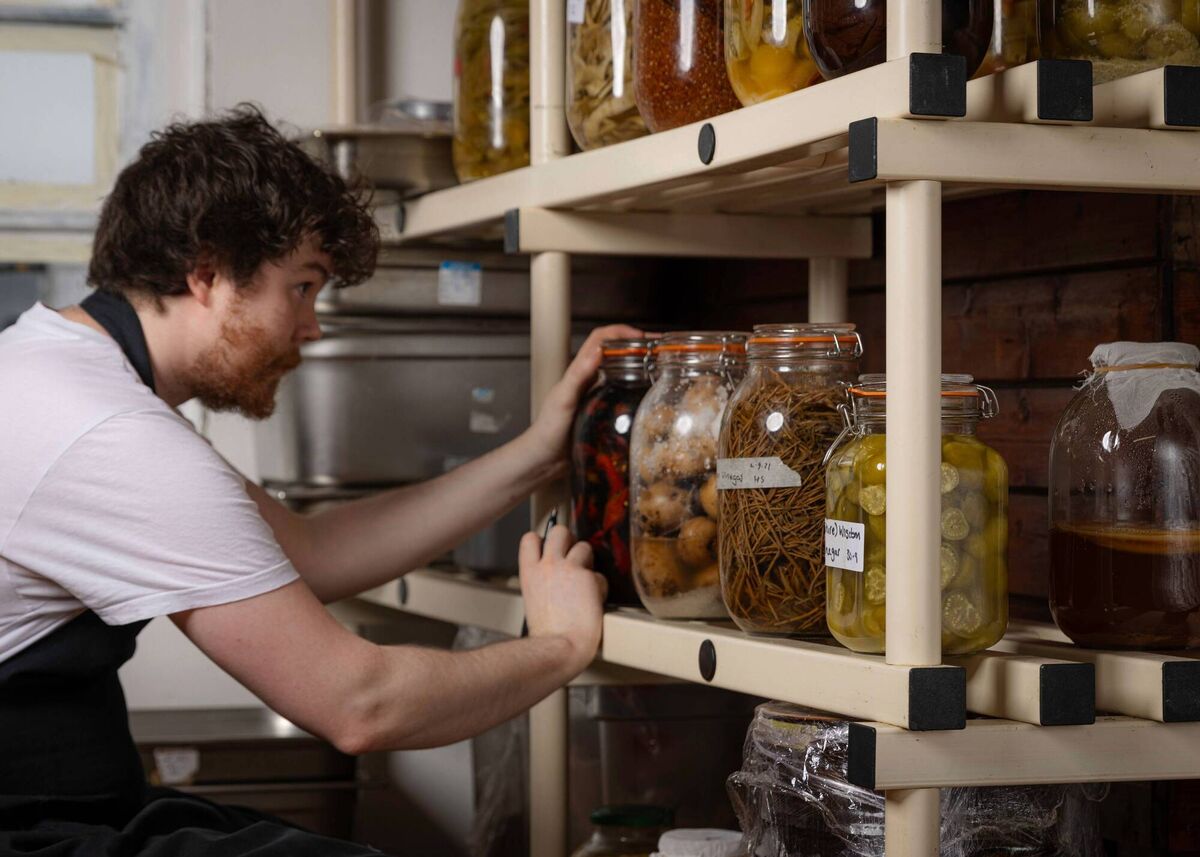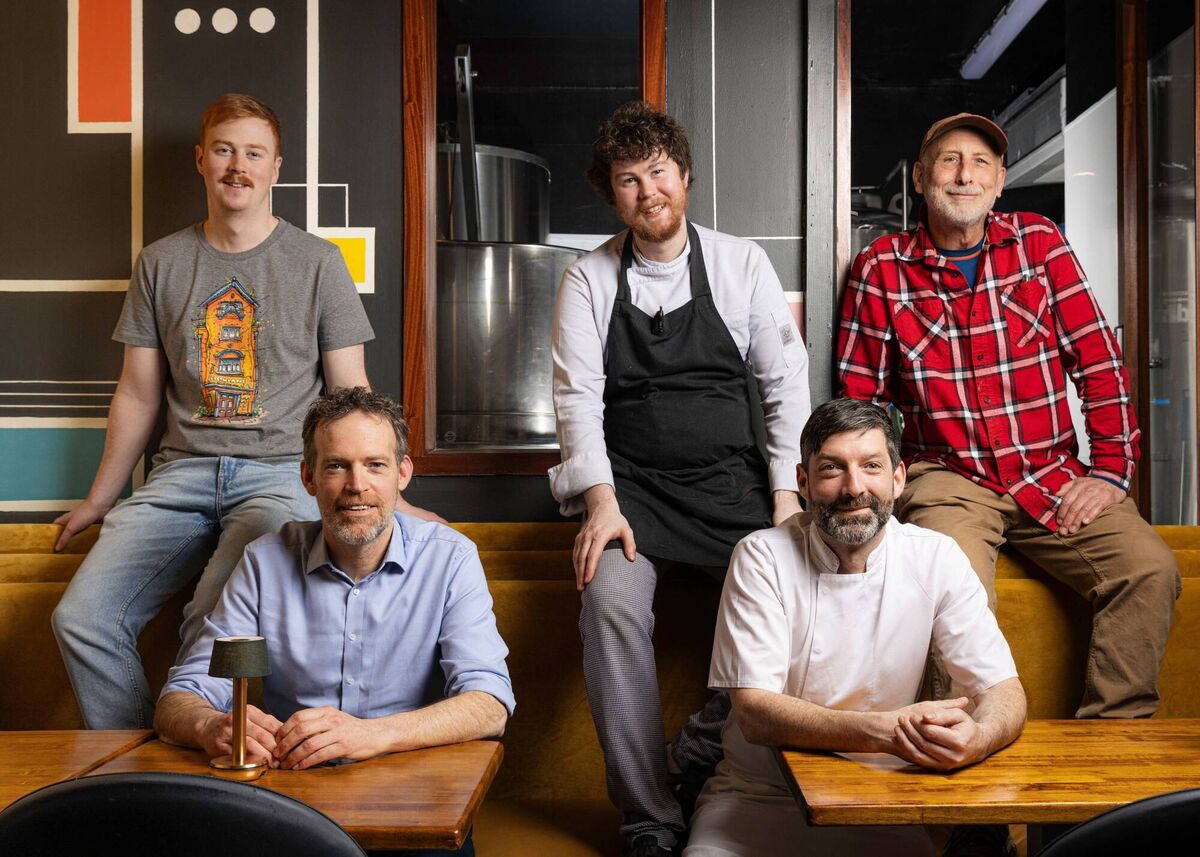A celebratory year for beer at Cork's Elbow Lane

Russell Garet, head brewer at Elbow Lane, who has worked in brewing for more than 35 years. Pictures: Ruth Calder-Potts
IN Mallory O’Meara’s book, Girly Drinks, she refers to an ancient Sumerian deity called Ninkasi.
“It was believed that beer was imbued with the spirit of Ninkasi herself. The elated buzz you feel halfway through your first glass? That was thought to be the essence of Ninkasi.”
I met with the spirit of Ninkasi back in January at Elbow Lane Smokehouse and Brewery, when I sampled a pint of a new specialty beer - a version of their in-house Angel Stout flavoured with smoked hazelnuts.
The first in a new collaborative series of experimental brews between Elbow Lane’s head brewer, Russell Garet, and head chef, Harrison Sharpe, these limited-edition unique brews celebrate the ten-year anniversary of Cork’s only co-located brewery and restaurant.
Praline sweet, richly nutty, malty and very moreish, I knew this was going to be one tasty year for beer at Elbow Lane…
Russell Garet has worked in brewing for over 35 years. Breweries both big and small, first in the U.S, then in Ireland since the late ’90s, he was part of the team who established the original Franciscan Well brewery and worked there for 12 years before joining Elbow Lane in 2014 to help build the brewery.

Harrison Sharpe joined Elbow Lane in 2017 and rose to Head Chef by 2019. He has a penchant for the experimental, and his food is heavily influenced by seasonal ingredients and tapping into the flavours and textures the beer-making process uniquely affords him and his kitchen.
Elbow Lane has a core of five beers, all brewed in accordance with something called The Reinheitsgebot, a German Purity Law for beer that dates to 1516. Russell quips it’s possibly the world’s first consumer protection law, which states beer should be made with just three ingredients: water, barley and hops. Flavour differences come from using a variety of hops added at different stages of brewing, and how much the barley is roasted.
Brewing in this way provides certainty about quality, but it can also be restrictive. Anything added outside those three ingredients puts it in the realm of specialty beer, and it’s this Elbow Lane is embracing, with a year-long roll out of exciting new brews and unique collaborations.
The nanobrewery is nestled in a tight space at the back of the restaurant. The stainless-steel kettles are packed in like sentries, with fermenters on the floor above, linked by a forest of pipes and a direct vein to the taps in the bar. From tank to tap is less than 30 feet.
“I never thought I would work in a restaurant that had its own brewery,” says Harrison.
There aren’t a lot of places that do that together, especially one that is as fifty-fifty as Elbow Lane.
This proximity means all beers are devised with food in mind, and dishes are created with beer pairings in mind, too. It’s a symbiotic relationship between brewer and chef not replicated with such attention to detail anywhere else – certainly in Cork, if not Ireland.

“Beer and food are paired and included in a lot of dishes around Europe,” says Russell. “Fish and chips with ale in the batter, beef cooked in brown ale in Belgium, and in Ireland we cook lamb stew in stout. Beer’s been used in cooking a lot, it’s just never really celebrated as much or experimented with as much. That’s more of what we do here: we expand on that tradition and bring something new to it.”
Un-hopped wort extract, brewer’s yeast for making miso dashi, spent grain, crystal malt and cascade hops, all have been handed off between brewer and chef to add points of difference on the Elbow Lane menu.
Harrison’s side project is The Fermentary. Hidden in the very top of the slim 18th century building, shelves are filled with jars, crocks, vinegar barrels and bottles housing pickles, ferments, vinegars, kombuchas, dried herbs and vegetables.
The mention of beer vinegar piques my interest. Why not? We have wine vinegar and cider vinegar, so why not beer vinegar?
“We use it like any other vinegar,” says Harrison. “We’ve used it for pickles, it’s really nice in dressings. We also have a celery vinegar that’s lovely as a finishing vinegar with oysters, or in a celery butter sauce for your fish.”
They say lots of the best ideas happen over a pint, and while Russell has finished his day and winds down at the bar with a beer, Harrison is cranking up the fire ahead of a busy night’s service. Soon enough, ideas start to fly.
“I said, let’s do a hazelnut porter - we can get a hazelnut extract over in the English Market. But then Harrison says, why don’t we make our own extract?” explains Russell.
“That’s really where the collaboration kicks off. We could go to our local market and get extracts, but that’s taking the uniqueness out of how we do things.
The hazelnut extract Harrison made was made with our own brewer’s wort (un-hopped beer), so now there’s us taking a whole other twist on it.
Right now, the kind of ideas kicking around for new speciality brews for the year ahead include a Mocha Maple Amber Ale, a Quince Red Ale, and a Rhubarb Sour. While the Reinheitsgebot has been well and truly kicked to the kerb for this wild experimentation to take place, the ethos of seasonality is very much at the heart: hazelnuts in winter, rhubarb in spring, quince in autumn.
Resting in the tanks right now is a 900-litre brew of a strong ruby ale which is destined to be broken down into small batches with each given a different treatment, creating a variety of expressions from the same base beer.
“We used a special malt that came in from Germany that imparts notes of rich plum, prune, cocoa, and toast. There are some other speciality malts in there for more richness, malt character and a lovely colour, and we’ve also used some English hops from Kent,” says Russell.
Half of this beer is destined to be barrel-aged in a virgin oak barrel sourced from Burgundy in France and made from French and American oak. That would be exciting enough, but there is another layer to this collaboration.
“We’re doing a collaboration with Rebel City Distillery,” explains Russell. The distillery makes gin, vodka and Ireland’s only absinthe, and what’s planned is an entirely unique spirit.
“We’ll age our special beer in the barrel, then, when the time is right, we’ll pull it out of the barrel, put that on tap in the bar as a special, and the barrel will go to Rebel City Distillery,” says Russell.
They’ll be producing a spirit, most likely a gin, and aging it in that barrel.
A beer-seasoned barrel-aged gin? Literally, hold my beer…
“We arranged to collaborate first, thought carefully about the barrel, and then formulated the beer. We realised there were a lot of considerations. Not just the beer as a stand-alone product, but how it’s going to react with the wood, and then how that Rebel City Distillery gin will react to the barrel that’s had our beer in it.”
March is when the un-aged Ruby Ale will be pouring from the taps at Elbow Lane, with the barrel-aged coming on after. It’s all a matter of time and constant monitoring for when Russell considers it ready. But as its virgin oak, the aging process will be much quicker so we shouldn’t be waiting too long.
“It’s an exciting project, one we haven’t been involved with here before, and that’s a good thing,” says Russell.
In a sort of reunion of Elbow Lane alumna, two other collaborations are on the cards for the year. Former assistant brewers, Jake Biggerstaff and David Marcos, who have gone on to have great careers in brewing, are coming back to their Alma Mater to each work on a new beer recipe as part of the year-long celebrations.
That’s part of the beauty of keeping things at nanobrewery level. It affords a flexibility and deftness of innovation that bigger breweries simply cannot do.
“The bigger breweries can’t do that,” says Russell.
Being as small as we are, we can do all kinds of wacky, experimental projects the big guys can’t.
The brewery at Elbow Lane has a capacity to run between 12 and 15 five-hundred-litre brews a month and takes two back-to-back brews to fill a 1,000 litre fermenter.
“We don’t rely on filtration or additives to make the beer age quicker. We rely on gravity sedimentation,” says Russell.
“Over time, with a cold temperature, the sediments and yeast drop to the bottom of the tank to leave a relatively clear product. That’s when we know it’s ready. Filtration robs the beer of a certain flavour character and it’s just simply a more wholesome product; less adulterated.”
There’s a huge amount of quiet industry that goes on behind the scenes and under the radar at Elbow Lane – what Harrison refers to as the scaffolding.
“That’s the whole point,” he says. “We try to hide the real architecture of what we’re doing and make it look really simple from the outside.”
These celebratory and collaborative brews will be on tap roughly every two months. It’s all a matter of time – the beer will tell Russell and Harrison when it’s ready. That’s the real architect of Elbow Lane Smokehouse and Brewery.
The restaurant is open seven days a week for evening service. Beer flights are available, and restaurant staff are trained in how to pair food and beer. Ask for the speciality beer.







 App?
App?


